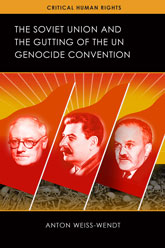|
The Soviet Union and the Gutting of the UN Genocide Convention
Anton Weiss-Wendt
Critical Human Rights Series
Steve J. Stern and Scott Straus, Series Editors
After the staggering horrors of World War II and the Holocaust, the United Nations resolved to prevent and punish the crime of genocide throughout the world. The resulting UN Genocide Convention treaty, however, was drafted, contested, and weakened in the midst of Cold War tensions and ideological struggles between the Soviet Union and the West.
Based on extensive archival research, Anton Weiss-Wendt reveals in detail how the political aims of the superpowers rendered the convention a weak instrument for addressing abuses against human rights. The Kremlin viewed the genocide treaty as a political document and feared repercussions. What the Soviets wanted most was to keep the subjugation of Eastern Europe and the vast system of forced labor camps out of the genocide discourse. The American Bar Association and Senate Committee on Foreign Relations, in turn, worried that the Convention contained vague formulations that could be used against the United States, especially in relation to the plight of African Americans. Sidelined in the heated discussions, Weiss-Wendt shows, were humanitarian concerns for preventing future genocides.
Anton Weiss-Wendt directs research at the Center for the Study of the Holocaust and Religious Minorities in Oslo, Norway. He is the author of Murder Without Hatred: Estonians and the Holocaust and Small-Town Russia: Childhood Memories of the Final Soviet Decade; editor of The Nazi Genocide of the Roma; and coeditor of Racial Science in Hitler's New Europe, 1938–1945.
Praise
“An absorbing and important contribution to the history of the Cold War, as well as to international law and its political uses.”
—Peter H. Solomon Jr., author of Soviet Criminal Justice under Stalin
“A fascinating study of the political manipulation, by both superpowers, of the Genocide Convention as it was being drafted at the dawn of the Cold War and in the period following its adoption.”
—William Schabas, author of Genocide in International Law: The Crime of Crimes
|

Larger images
July 2017
LC: 2016044010 HV
400 pp. 6 x 9
|

